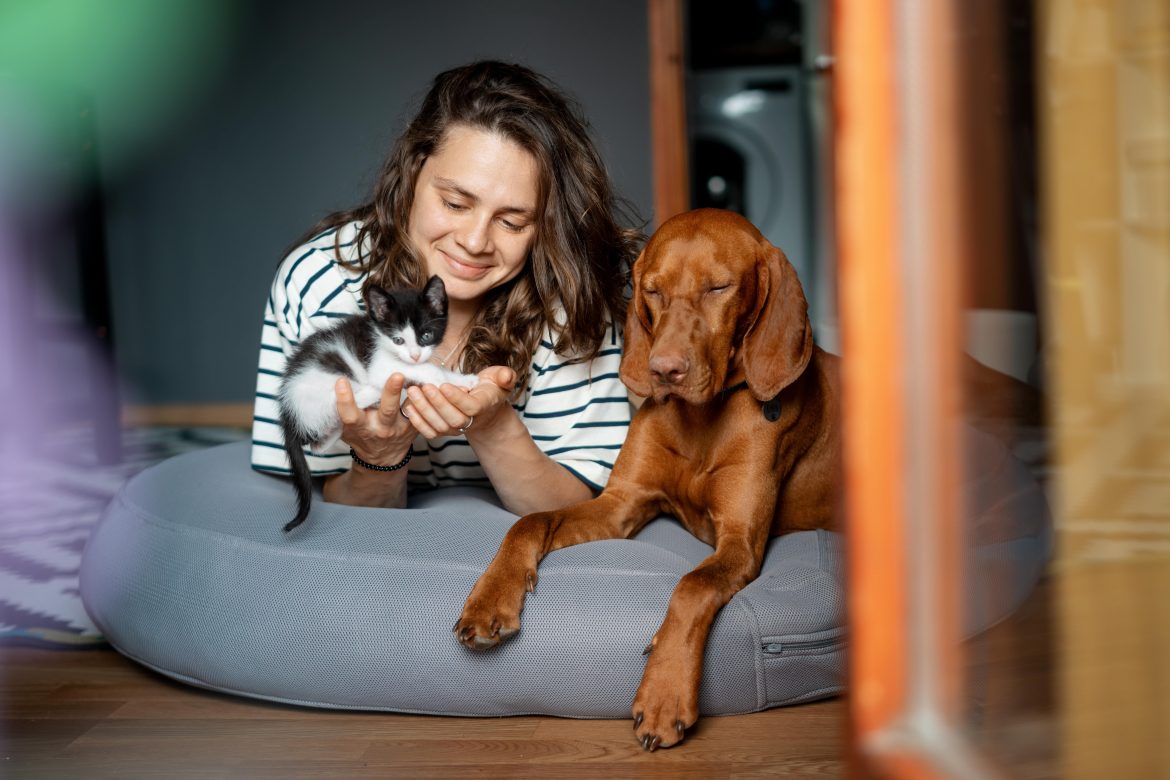Adopting a furry family member is a big deal, there’s no sugar-coating it. Before you adopt a pet, you need to make sure you’re 100% ready to help them settle in. Don’t worry though, we’ve got a complete pet adoption checklist to help you out!
The day a rescue pet gets adopted is the day they say ‘goodbye’ to life in the shelter. They say ‘hello’ to people who love them and want to share their comfortable home. Many assume that it’s the best day of that furry creature’s life. It’s a day that will change their life forever, but for some animals, the feeling of being overwhelmed may cloud everything else.
Making the decision to bring a furry friend into your family is a big one. Pets are a lot of responsibility but they are also incredible companions who offer unconditional love. There is definitely a lot to consider before you bring your pet home so let’s get straight into it.
Before You Adopt a Pet
Before you adopt your new pet, think about getting them some food and treats, bowls for food and water, a bed, a leash and collar (for your new doggo), and maybe some toys (it’s important to keep them entertained).
Discover: 7 Reasons Why Mixed Breed Dogs Are Awesome
Other things to consider are:
Pick a place for your pet
Moving is just as difficult for pets as it is for humans, so determine where your pet will be spending most of his or her time in advance. Because they will be under a lot of stress with the change of environment (from a shelter or foster home to your house), they may forget all the house-training (if any) they’ve learned.
Often a kitchen will work best for easy clean-up for dogs and a bathroom or spare bedroom for cats and kittens to get them used to your home.
Pet-proof the area where your pet will spend the most time
This may mean taping loose electrical cords to baseboards; storing household chemicals on high shelves; removing plants, rugs, and breakables; covering expensive furniture and installing baby gates.
Consider getting an ID for your new pet
Buy a cute collar with an ID tag or do some research into getting your pet microchipped. Bring an ID tag with your phone number on it with you when you pick up your pet so that they are extra safe in the first couple of days. Be sure to get your new fur-baby microchipped and register your contact information with the chip’s company if the rescue or shelter did not already do so.
Read this: Benefits of Microchipping Your Pet | Safety And Security
Do your research on pet insurance
Just like us, animals can get sick or have accidents meaning that proper healthcare is vital for them. Great veterinary services can be costly which is why the right pet insurer can save you financially.
Make sure you do your research and find the best insurer for your new fur-baby and what they may need (we recommend checking out Oneplan Pet Insurance – they have a plan for every budget with great benefits). Remember, pets of different ages, may require different types of insurance.
Insuring the health of your pet is an important first step any responsible pet parent needs to take in order to ensure their newly adopted pet receives the expert care they deserve should something go wrong.
Plus, having other benefits in place such as vet visits and routine care will also help to shoulder the costs of ongoing pet healthcare. Giving you the peace of mind you need to solely focus on helping your pet adapt to their new home and ensuring your pet’s health is looked after when something goes wrong.
Adding to this, adopted pets can often come with underlying health concerns that may only start to show symptoms later on in your pet’s life. Which is why having a comprehensive pet insurance plan gives you the cover your pet (and your budget) needs to lead a long, healthy and happy life.
Their first day in their new home
The first few days in your home are special and critical for a pet. Your new furry friend will be confused about where he is and what to expect from you. Setting up some clear structure with your family for your dog or cat will be paramount in making as smooth a transition as possible.
Give your furry friend time to acclimate to your home
Give your pet some time to adjust to your home and immediate family before introducing him to strangers. Make sure you’ve spoken to your kids about bein
Find out what they eat before you buy food
When you pick up your pet, remember to ask what and when he was fed. Replicate that schedule for at least the first few days to avoid gastric distress. If you wish to switch to a different brand, do so over a period of about a week by adding one part new food to three parts of the old for several days; then switch to half new food, half old, and then one part old to three parts new.
Take them home in a crate
On the way home, your new pet should be safely secured, preferably in a crate. Some animals find car trips stressful, so having him in a safe place will make the trip home easier on him and you.
Show them where to do their business
Once home, take them to their toilet area immediately and spend a good amount of time with them so they get used to the area and relieve themself. Even if your pet does relieve themself during this time, be prepared for accidents.
Now comes the fun
From there, start your schedule of feeding, toileting and play/exercise. From Day One, your pet will need family time and brief periods of solitary confinement. Don’t give in and comfort them if he whines when left alone. Instead, give them attention for good behaviour, such as chewing on a toy, some catnip or a treat.
Remember to be calm and patient
For the first few days, remain calm and quiet around your pet, limiting too much excitement. Not only will this allow your fur-baby to settle in easier, but it will also give you more one-on-one time to get to know them and their likes/dislikes.
The days and weeks to follow
People often say they don’t see their new pet’s true personality until several weeks after adoption. Your pet may be a bit uneasy at first as they get to know you. Be patient and understanding while also keeping to the schedule you intend to maintain.
More tips: 10 Habits to Maintain for Happy & Healthy Pets
When are they ready for adventures?
After discussing it with your veterinarian to ensure your pet has all the necessary vaccines, you may wish to take your dog to group training classes or the dog park. If you’ve adopted a cat, once you know they’ve had their vaccines and are healthy, you can start to venture outside (this should only be done when your new kitty is 100% used to and accustomed to your home. This might take a couple of weeks).
Stick to the schedule you’ve created
To have a long and happy life together with your new fur-baby, stick to the original schedule you created, ensuring your pet always has the food, potty time and attention they need. You’ll be bonded in no time! If you encounter behaviour issues you are unfamiliar with, ask your veterinarian for help.
Remember, when you adopt a pet, it is a long-term responsibility and you need to be patient enough to stick it out when it gets difficult. Trust us, it will be worth it.
Yours in Not-So-Average Pet Advice,
The Petinsurance.co.za Team



